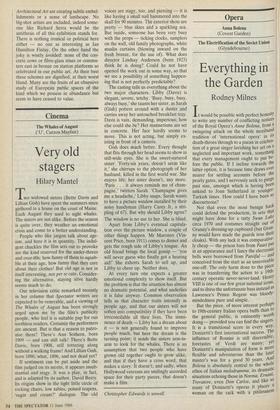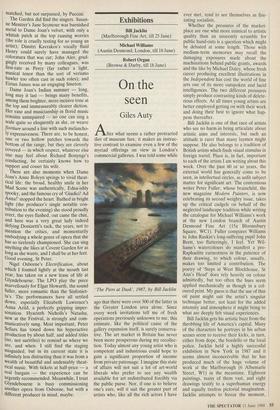0 era
Anna Bolena (Covent Garden)
Everything in the Garden
Rodney Milnes
It would be possible with perfect honesty to write any number of conflicting notices of the Royal Opera's Anne Bolena, from a swingeing attack on the whole moribund tradition of 'international opera' in its death-throes through to a paean in celebra- tion of a great singer lavishing her art on a neglected and important work, something that every management ought to put be- fore the public. If I incline towards the latter option, it is because time draws ever nearer for settling accounts before the pearly gates, and I nervously seek to purge past sins, amongst which is having been unkind to Joan Sutherland in younger' Turkish times. How could I have been so discourteous? Not that even the most benign hack could defend the production, in sets that might have done for a tatty Swan Lake circa 1970 and costumes straight out 0' Granny's dressing-up cupboard (but Gran- ny would have made the guards iron their cloaks). With any luck it was comparative- ly cheap — the prison bars from Faust put in an appearance and I fancy the electronic bells were borrowed from Parsifal — and conceived from the start as an unrevivable one-off. The only harm done to the piece was in transferring the action to a 19th century operatic never-never-land. Henry VIII is one of our few great national icons, and to dress the unfortunate bass instead as Lawrence's Prince Regent was bloody' mindedness pure and simple. But the piece, of more interest perhaps to 19th-century Italian opera buffs than to the general public, is eminently worth doing — provided you can find the singerS• It is a transitional score in every way, Donizetti's first international success. The influence of Rossini is still discernible, foretastes of Verdi are many; Yet Donizetti's manipulation of form is more flexible and adventurous than the later master's was for a good 30 years. And Bolena is absolutely central to the whole ethos of Italian melodramma, its dramati,e situations echoing those in Norma, Ernant, Trovatore, even Don Carlos, and like so many of Donizetti's operas it places a woman on the rack with a pitilessness matched, but not surpassed, by Puccini. The Garden did find the singers. Susan- ne Mentzer's Jane Seymour was burnished metal to Dame Joan's velvet, with only a Whitish patch at the top causing worries (the role is cruelly testing for so young an artist); Dimitri Kavrakos's vocally fluid Henry could surely have managed the coloratura that was cut; John Aler, grud- gingly received by many colleagues, was first-rate as Percy (far rather a light, musical tenor than the sort of verismo bawler too often cast in such roles); and Eirian James was an engaging Smeton.
Dame Joan's Indian summer — long, long may it last — brings many benefits, among them brighter, more incisive tone at the top and immeasurably clearer diction. Her ease and musicianship in florid music remains unimpaired — no one can sing a scale quite so eloquently as she, or weave fioriture around a line with such melancho- ly expressiveness. There are, to be honest, one or two hollow patches towards the bottom of the range, but they are cleverly covered — in which respect, whatever else one may feel about Richard Bonynge's conducting, he certainly knows how to support and cosset his wife.
There are also moments when Dame Joan's Anne Boleyn springs to vivid theat- rical life: the broad, healthy smile in her Mad Scene was authentically, Edna-ishly Spooky, and the famous cry of `Giudici! Ad Anna!' stopped the heart. Bathed in bright light (the producer's single notable con- tribution to the evening) she stood proudly erect, the eyes flashed, out came the chin, and here was a very great lady indeed defying Donizetti's rack, the years, not to mention the critics, and momentarily embodying a whole genre of opera that she has so tirelessly championed. She can sing anything she likes at Covent Garden for as long as she wants, and I shall be at her feet. Good evening, St Peter.
Nigel Osborne's Electrification, about Which I foamed lightly at the mouth last Year, has taken on a new lease of life at Glyndebourne. The LPO play the piece marvellously for Elgar Howarth, the sound fuller, more romantic than the Sinfoniet- ra's. The performances have all settled down, especially Elizabeth Lawrence's Anna Arild, a perfectly gripping imper- sonation. Hyacinth Nicholls's Natasha, new at the Festival, is strongly and com- municatively sung. Most important, Peter Sellars has toned down his hyperactive Production by about half, and added titles (no, not surtitles) to remind us where we are, and when. I still find the staging misguided, but in its current state it is infinitely less distracting than it was from a wealth of beautiful and undeniably theat- rical music. With tickets at half-price — a real bargain — the experience can be urgently reconunended. Meanwhile, I trust Glyndebourne is busy commissioning another opera from Osborne, but with a different producer in mind, maybe.



































































 Previous page
Previous page